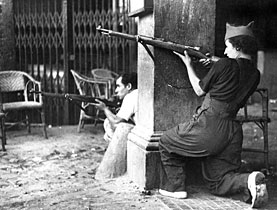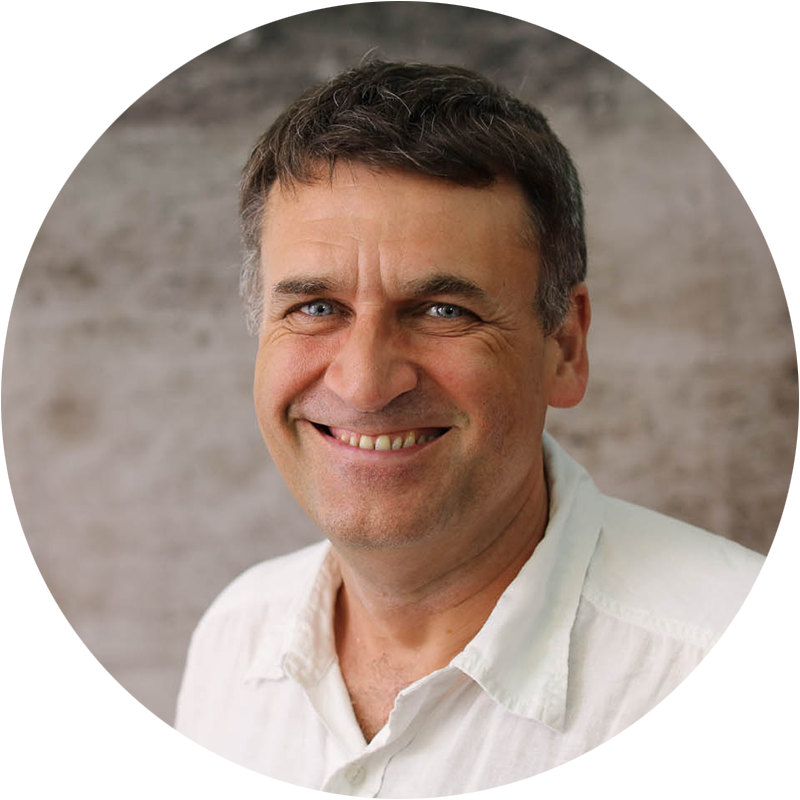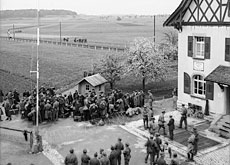No pardon for Spanish civil war helpers

Swiss volunteers fought alongside the Republicans in the Spanish Civil War, incurring punishments when they returned home. They have still not been pardoned.
A group fighting for their rehabilitation has published a list of the volunteers’ names to heighten awareness of this forgotten chapter of Swiss history – 70 years on.
“We are in a state of enthusiasm. It’s not pure anarchism here. Our Spanish companions have shown that you can live without masters… We are experiencing moments of intense emotion and I feel 20 years old again. It was my dream, the revolution has been my entire life’s aspiration. And we are living it here on its moral and material levels – what more could a militant want?”
These words were written on August 6, 1936 by Domenico Ludovici. The Italian, who emigrated to Switzerland in 1907 and was a collaborator on a Geneva anarchist journal, shows how the first letters home to Switzerland were full of enthusiasm.
Civil war broke out on July 18 of that year. In many countries, including Switzerland, there was great sympathy for the Republican government camp – demonstrations were organised and funds were collected.
But the Swiss government, mindful of the country’s neutrality, intervened a month later, banning fundraising and recruiting activities.
800 Swiss volunteers
Thousands of volunteers from all around the world poured into Spain to bolster the Republican forces. Despite the governmental ban, around 800 came from Switzerland, including a small number of women.
“Proportionally the Swiss contingent was one of the largest, perhaps after the French and Luxembourgian ones,” said Mauro Cerutti, a historian and professor at Geneva University.
“The fact that there had been emigration from Italy to Switzerland of an antifascist nature certainly helped to raise awareness and prompt recruitment. Moreover, of these 800 volunteers around 100 were Italians resident in Switzerland.”
According to a 2001 study on the issue, around 60 per cent of the volunteers were Communist. There were also socialists, anarchists and antifascists.
Around 170 of the Swiss contingent died in the fighting. Defeated and humiliated by the Nationalist rebels, the rest returned home where they had to face the justice authorities.
“Most of the judgements were based on article 94 of the militarily penal code which banned Swiss citizens from enlisting in a foreign army without express permission of the government,” explained Cerutti.
Punishments
In all, 420 sentences were handed down, ranging from around two weeks to four years in prison.
“These sentences were reinforced by penalties depriving people of their civic rights, these young people were marginalised and found themselves in very difficult professional and social situations,” added Cerutti.
The historian says that among the democratic countries “Switzerland was probably the state that systematically punished volunteers in the harshest way”.
A proposed amnesty was debated and then rejected by parliament in 1939, mostly for neutrality reasons. Cerutti maintains that this was a “paradoxical” argument because people had taken part of their own accord and not in any official capacity.
There have been several rehabilitation motions – also for people involved in anti-Nazi activities – since the Second World War.
In 2002, parliament partially accepted a proposal by Social Democrat parliamentarian Paul Rechsteiner to pardon those who helped refugees illegally cross the border into Switzerland during the Nazi regime. But it refused to extend this to the Spanish Civil War volunteers and the Swiss who joined the Resistance during the Second World War.
Latest motion
In 2006 Rechsteiner returned to the issue, this time calling for the annulment of the sentences given to the volunteers and the Resistance fighters.
This motion has the support of a lobby group, founded last year. It has now published a complete list of all the Swiss volunteers.
Parliamentarian Markus Hutter, co-signatory of Rechsteiner’s initiative and son of former volunteer Hans Hutter, believes it is high time for rehabilitation, especially as some of those affected are still alive.
“My father was only made to serve 14 days in prison, but it’s not about that,” he said.
“It has always been thought that the Republican volunteers should have been treated better from a political point of view.”
“They fought for the right side, for a legitimate regime, in a conflict now seen as a precursor to the Second World War.”
Now 70 years after the event, he says it is time for Switzerland to join other western countries which have rehabilitated their volunteers.
swissinfo, based on an Italian article by Daniele Mariani
From 1936 to 1937 around 40,000 volunteers from more than 50 countries arrived in Spain to help the Republicans fight against General Franco’s rebels.
Approximately 50% of them died in combat, disappeared or were injured.
The French were the most numerous volunteers at around 10,000. The United States and Britain also fielded a significant numbers. Brigades were normally divided up according to nationality.
The brigades were formally withdrawn from Spain late in 1938 as part the Republicans’ attempt to win international support. A farewell parade was held for the volunteers in Barcelona.

In compliance with the JTI standards
More: SWI swissinfo.ch certified by the Journalism Trust Initiative









You can find an overview of ongoing debates with our journalists here . Please join us!
If you want to start a conversation about a topic raised in this article or want to report factual errors, email us at english@swissinfo.ch.